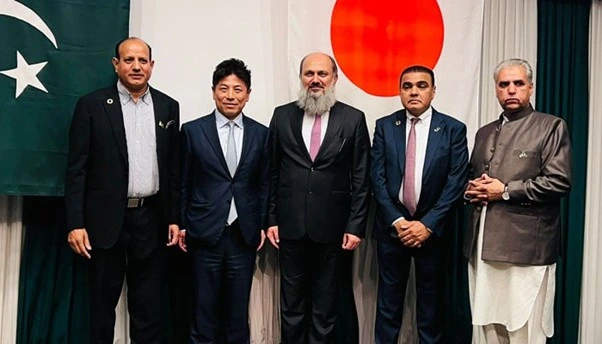Underlining the strategic relevance in the South Asian country placed on its relationship with the East Asian economic superpower, Pakistan is deliberately trying to improve and enlarge its trade relations with Japan. During a high-level business conference hosted at the Pakistani Embassy in Tokyo, which provided a vibrant forum for promoting bilateral economic cooperation, Federal Minister for Commerce Jam Kamal lately underlined this dedication.
Attended by eminent Japanese business executives, government dignitaries, and esteemed members of the Pakistani diaspora, the event marks a turning point in diplomatic and commercial interaction between the two nations. Its main goals were to create closer economic relationships, draw attention to Pakistan’s great range of investment prospects, and expose the Japanese market to a wide spectrum of Pakistani goods and services.
Minister Jam Kamal underlined in his keynote speech Pakistan’s strong esteem for its relationship with Japan as a strategic alliance based on mutual respect and shared economic interests. To show a proactive attitude to economic diplomacy, he observed that the Pakistani government is acting boldly and pragmatically to improve trade and commercial relations.
One of the Minister’s highlights was Pakistan’s active attendance in Expo 2025 Osaka, where the pavilion has already drawn notable notice. Japanese people have been visiting the Pakistani stand, which showcases creative industrial items, textiles, handicrafts, and cultural relics, especially. Considered as a sign of future trade potential and a forerunner of long-term economic alliances, this increasing interest in Pakistani products is
Using the chance to invite Japanese investors to investigate Pakistan’s great unrealized potential, Minister Kamal sent an open invitation. Among the important areas ready for investment, he pointed out industry, agriculture, technology, and infrastructure. Apart from forming the backbone of Pakistan’s economy, these industries fit very nicely with Japan’s areas of industrial strength and innovation.
Aiming at boosting investor trust, the Minister revealed that the Prime Minister of Pakistan has established a specific “foreign investor facilitation cell.” This unique entity is assigned to quickly identify and solve the difficulties experienced by foreign investors, therefore eliminating bureaucratic obstacles and fostering an environment more favourable for investment. Jam Kamal claims that this project is not only symbolic; it shows a real will to make Pakistan a more appealing and reachable location for world capital.
One of the most open sections of the Minister’s speech discussed bilateral trade as it stands right now. Although Japan is a valuable trading partner, he admitted that trade volume still falls short of its actual capacity and is currently slanted in Japan’s advantage. Japanese imports much more than Pakistani exports, which results in a trade deficit the Pakistani government is resolved to correct. To this goal, he underlined that a fresh strategic approach is being followed, one aimed at raising the visibility and accessibility of Pakistani goods and so improving their competitiveness in Japanese markets.
Targeted trade promotion initiatives, bilateral exchanges, and business-to-business (B2B) links facilitation include part of this approach. To guarantee Pakistani goods satisfy the stringent criteria of the Japanese market, the government is also trying to simplify regulatory procedures and enhance quality assurance systems.
Apart from trade, the business conference in Tokyo acted as a cultural link, improving mutual understanding between the two countries and encouraging person-to-person relationships. In this sense, Pakistani business people living in Japan were rather important since they were unofficial champions of success stories reflecting the combination between Pakistani creativity and Japanese accuracy.
Clearly, the Minister’s call to action is that reciprocal engagement, openness to cooperation, and a shared vision of economic growth are necessary for trade relations to flourish. With the foundation set by the present government and ongoing goodwill from the Japanese government and business sector, he expressed hope that a new chapter in Pakistan-Japan commercial relations is about to open.
Analysts point out that this effort fits quite well strategically. Japan has showed interest in investigating alliances with developing nations like Pakistan in its attempt to diversify supply chains and lower reliance on a small number of markets. Pakistan is progressively seen as a regional centre with great economic potential given its young population, strategic position, and growing infrastructural network.
Moreover, Pakistan’s involvement in big worldwide expos like the one in Osaka points to a more active than reactive change in its foreign trade policy. Pakistan is making a strong statement by directly interacting with Japanese stakeholders and outlining a clear investment facilitation road map: it is open for business and eager to cooperate on equally fair terms.
The recent event held at the Pakistani Embassy in Tokyo not only highlighted the government’s will to improve economic relations with Japan but also offered a guide for how strategic outreach, policy change, and active participation may help to build such partnerships. The chances for closer economic collaboration with Japan seem better than ever as Pakistan keeps projecting itself as a desirable place for foreign investment. The two nations are well-positioned to convert their historic affinity into a vibrant trade and investment alliance with persistent efforts and sincere cooperation.







